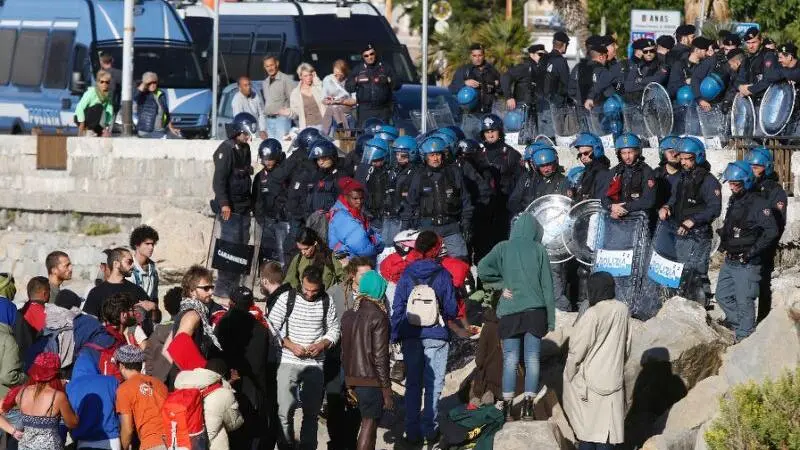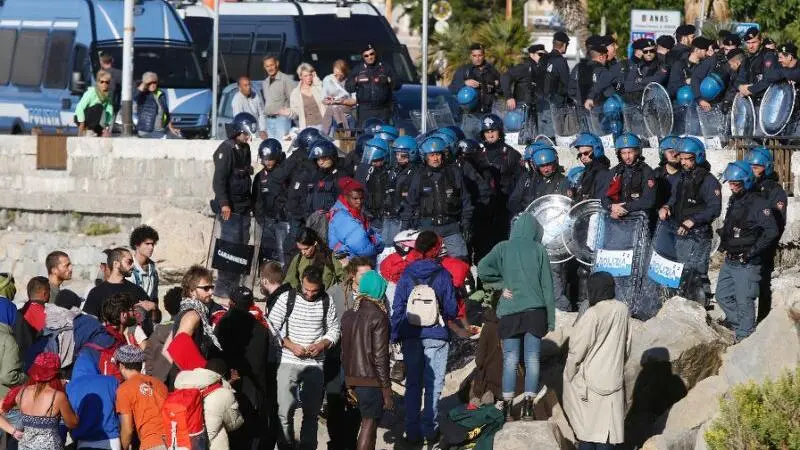Address
304 North Cardinal St.
Dorchester Center, MA 02124
Work Hours
Monday to Friday: 7AM - 7PM
Weekend: 10AM - 5PM
Address
304 North Cardinal St.
Dorchester Center, MA 02124
Work Hours
Monday to Friday: 7AM - 7PM
Weekend: 10AM - 5PM


Tensions have been mounting recently between Italy and France, in a spat that could have long-term repercussions on the European Union as a whole. At the root of the issue is the new Italian government’s refusal to accept groups of migrants rescued in early November by four NGO ships in the Mediterranean Sea.
In the first days of November the Rise Above carrying 89 migrants and the Humanity 1 with 179 migrants on board asked permission to dock on Italian ports followed by the Ocean Viking with 234 migrants on board and the Geo Barents carrying 572. Italian authorities granted permission only to the Humanity 1 and later to the Rise Above, which docked in Catania and Reggio Calabria on November 6 and 8 respectively, but then allowed only people needing treatment to come ashore. The Geo Barents was also allowed to dock under the same conditions. The remaining men on board (numbering 35 and 215), referred to as “residual cargo” by Italian Minister of Interior Matteo Piantedosi, were allowed to disembark only later on, when they threatened to jump off the ships.
In the meantime, the other ship, the Ocean Viking, which was stranded for weeks off the Strait of Messina, did not receive any response from the Italian authorities. Minister Piantedosi insisted on a peculiar interpretation of the EU Dublin Regulation on migration. International law states that people stranded at sea should be let ashore in the closest safe port. The Dublin Regulation stipulates that asylum seekers need to stay in the country they first enter. Such provisions put extra strain on the countries on the northern shore of the Mediterranean, including Italy, which receive most of the migrants trying to reach the European Union. According to Piantedosi, the people on board the Ocean Viking and the Humanity 1, respectively run by French and German charities, have first stepped on these two countries’ soil and as such should be resettled by Paris and Berlin.
This move drew the ire of France, which found itself blindsided by its south-eastern neighbour. French Minister of Interior Gérard Darmanin harshly condemned Italy’s behaviour and denied any such concessions would take place, before caving in and allowing the ship to harbour in Toulon. Darmanin did point out that it was a one-time exceptional measure and announced that France would freeze a plan to take 3500 migrants currently in Italy, inviting other European countries (including Germany) to backtrack on their commitments following Italy’s decision.
French-Italian relations have reached a new low since 2018, when then-Minister of Foreign Affairs Luigi Di Maio sympathised with the yellow vest protests, prompting Paris to withdraw its ambassador in Rome. Italian President Sergio Mattarella has tried to patch up relations with a phone call with his French counterpart Emmanuel Macron, but the immigration stance of new Prime Minister Giorgia Meloni’s government is likely going to reopen the issue in the long term.
Indeed, the situation bears resemblance with Matteo Salvini’s stint as minister of interior in 2018-19, that was characterised by harsher stances on migration and requests for a fairer European burden sharing. Salvini himself, currently minister of infrastructure and transport and deputy prime minister, has applauded the handling of the migrant issue with France.
However, Italy’s spat with France should not be seen merely as a row on the matter. The Meloni government has assured Italy’s allies of its belonging to the EU and NATO camp, which some had doubted considering the right-wing parties’ Eurosceptic rhetoric in the past. At the same time, the new government has vowed to protect Italy’s “national interests”, meaning that it will push for a more autonomous role in foreign policy and will not easily accept EU policies that run against Italy’s gains for the sake of the Union.
Meloni also knows that she cannot afford to be at loggerheads with EU institutions and other member states that seemingly will not see Italy’s new posture in a good light. Bad relations will likely hamper the Union’s functioning and effectiveness, damaging its cohesion. Meloni needs to carefully jockey and balance, or she will risk harming those national interests that she vowed to protect. If this migration spat is the opening act, it did not play out too well.